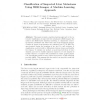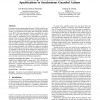435 search results - page 32 / 87 » Methods to Learn Abstract Scheduling Models |
122
click to vote
ECCV
2006
Springer
16 years 4 months ago
2006
Springer
Abstract. Bottom-up approaches, which rely mainly on continuity principles, are often insufficient to form accurate segments in natural images. In order to improve performance, rec...
141
click to vote
EPEW
2010
Springer
15 years 3 months ago
2010
Springer
Abstract. Restricting the power of the schedulers that resolve the nondeterminism in probabilistic concurrent systems has recently drawn the attention of the research community. Th...
145
click to vote
BMCBI
2011
14 years 9 months ago
2011
Background: Many practical tasks in biomedicine require accessing specific types of information in scientific literature; e.g. information about the results or conclusions of the ...
92
Voted
MICCAI
2008
Springer
16 years 3 months ago
2008
Springer
Abstract. This paper presents a machine-learning approach to the interactive classification of suspected liver metastases in fMRI images. The method uses fMRI-based statistical mod...
146
click to vote
LCTRTS
2010
Springer
15 years 7 days ago
2010
Springer
Concurrent Action-Oriented Specifications (CAOS) model the behavior of a synchronous hardware circuit as asynchronous guarded at an abstraction level higher than the Register Tran...


